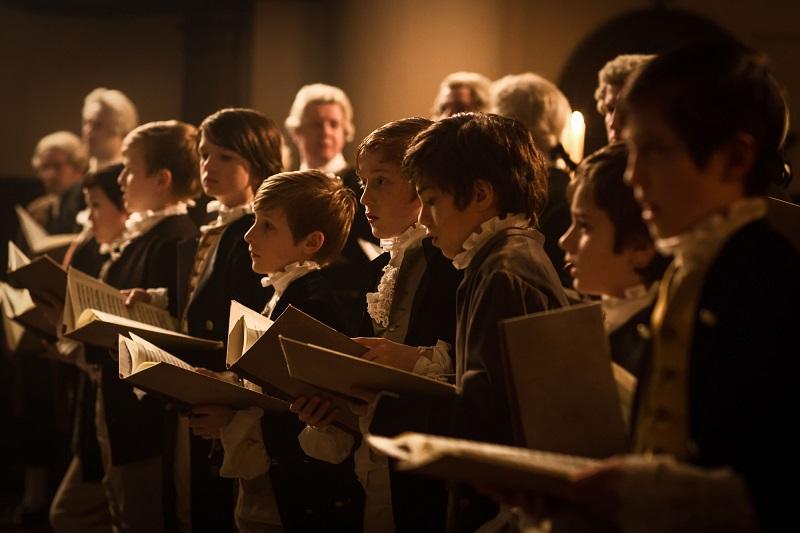Messiah at the Foundling Hospital, BBC Two | reviews, news & interviews
Messiah at the Foundling Hospital, BBC Two
Messiah at the Foundling Hospital, BBC Two
The story of Handel's oratorio and Coram's charity seductively told

The last time the BBC dramatised the creation of a great musical work, it didn’t quite hit the spot. Eroica starred Ian Hart as Beethoven glowering at the heart of a drama which had rather less of a narrative through-line than the symphony it honoured. For Messiah at the Foundling Hospital, the BBC have gone to the other extreme and kept eggs out of the one basket.
The story of Coram’s foundlings and the charity London premiere of Messiah has of course been prizewinningly imagined by Jamila Gavin in Coram Boy and wonderfully reimagined for the stage. This new telling deployed Tom Service as musical historian and Amanda Vickery (both pictured below with extras) as social historian to investigate the creation of, respectively, Georg Friedrich Handel’s oratorio and Thomas Coram’s hospital.
Every so often the research would pause for an apposite musical illustration
Once upon a time BBC Two, which celebrated its 50th birthday this week with a glorified clips show, would not have had to worry about talking across to the audience. But the two presenters were obliged to pretend they knew far less than they would if, for example, holding forth on the same subject on Radio 3’s Free Thinking, which as part of the BBC’s same Georgian season has been talking in depth about the 18th century all week. It’s always an awkward balancing act. Interviewing experts at Petworth House, the Sheldonian and the Coram Museum, both had a fit of the noddies as they agreed with everything they were being told, like oral examiners pleased to award full marks.
 But the pieces of the jigsaw – here a bewigged talking head, there atmospheric shots of the noisy labyrinth London remains - fitted well together: “Comfort Ye” as we learned of the declined in Handel’s fortunes as a composer of opera; “Every valley shall be exalted” as the Duchess of Somerset became Coram’s first aristocratic patron. A bewigged Paul McCreesh as Handel conducted the Gabrieli Consort and Players with Trinity Boys’ Choir, who at the end movingly burst into bright song with “For unto us a child is born”.
But the pieces of the jigsaw – here a bewigged talking head, there atmospheric shots of the noisy labyrinth London remains - fitted well together: “Comfort Ye” as we learned of the declined in Handel’s fortunes as a composer of opera; “Every valley shall be exalted” as the Duchess of Somerset became Coram’s first aristocratic patron. A bewigged Paul McCreesh as Handel conducted the Gabrieli Consort and Players with Trinity Boys’ Choir, who at the end movingly burst into bright song with “For unto us a child is born”.
The music being heard only in snippets, there could perhaps have been a bit more than one enthusiastic musicologist expounding on the seductive power of Handel’s composition. And in the key scene in which a desperate mother surrendered her newborn child to a committee of old men, the tragic intensity was notably absent - but then for lack of proper scriptwriting, television drama almost never parachutes well into television documentary.
There were plenty of illuminating insights to be getting on with about a composition whose impact extends to the present day not just through performance. Hogarth’s motto for the hospital arms was not in hi-falutin Latin but simply said “Help”: clearly the precursor of Bob Geldof’s “give us your fucking money”. When the wealthy audience heard Messiah, they did. Nul points for the expert who coined the verb “mysteriise”. But on the whole, hallelujah.
rating
Share this article
Add comment
The future of Arts Journalism
You can stop theartsdesk.com closing!
We urgently need financing to survive. Our fundraising drive has thus far raised £33,000 but we need to reach £100,000 or we will be forced to close. Please contribute here: https://gofund.me/c3f6033d
And if you can forward this information to anyone who might assist, we’d be grateful.

Subscribe to theartsdesk.com
Thank you for continuing to read our work on theartsdesk.com. For unlimited access to every article in its entirety, including our archive of more than 15,000 pieces, we're asking for £5 per month or £40 per year. We feel it's a very good deal, and hope you do too.
To take a subscription now simply click here.
And if you're looking for that extra gift for a friend or family member, why not treat them to a theartsdesk.com gift subscription?

Comments
Saw this for second time last